On this page:
- The April 2021 interview (video)
- The July 2020 interview
- The history of the school project
- The uniqueness of the school
- The school building
- Students
- Teachers
- The curriculum
- Extracurricular activities
- Reactions to the new school

We spoke to him twice:
• In July 2020, before the school opened. You can read it below the video,
• In April 2021, Our Kids interviewed Graham Lewis again, this time on video. Please watch it to find out how the school is doing in its first year.
The April 2021 interview (video)
The July 2020 interview
This interview was conducted less than two months before Wroclaw Cosmopolitan School opened in September 2020.
The history of the school project
Our Kids: Can you tell me about the history of this project?
Graham Lewis: It's a year in the making. There was a lot of discontent from two main groups: from parents and from teachers who worked in other schools in the English-speaking private school sector in Wrocław. They had a list of issues that they wanted resolved and they were looking for some kind of improvement on. So I was presented with these problems and was approached by a number of parents looking to set up a new school on the cooperative model and when that did not transpire, we chose the private investment model.
Our Kids: Why Wroclaw?
Graham Lewis: If you do an analysis of the private school market, you will notice that Wrocław is a massively untapped opportunity. There's huge foreign investment here and a pretty sizable expat community. Several tech companies are based here for their European development, e.g., Nokia, IBM, Google, and Amazon. The people working there are used to these big fancy schools with modern inquiry-driven approaches, and for those people there's really nothing in Wroclaw.
There are some conventional English-speaking private schools but nothing that's really cutting edge. We now have people who work for IBM and are moving here from Poznań or Katowice to send their kids to our school. So we definitely have hit the nail on the head in terms of interpreting what the demand is, what people are looking for, and what's missing in the city.
Our Kids: So you must have been in Poland then?
Graham Lewis: I used to work in Poland previously for four years but for the last four years I was in Hong Kong in a school leadership role, so I was known to a group of parents. They knew I had worked in big international schools in Asia and had done a lot of traveling for professional development within schools so every couple of months I was visiting schools around the world, in Asia in particular. They were looking to organize something like that, saying: “When we lived in Singapore, we had a school like that — why don’t we have one in Wrocław?”
Our Kids: What were they looking for?
Graham Lewis: Much more progressive pedagogy than is available and much clearer curriculum documentation and progression. We combine those two with an inquiry model, and place much bigger emphasis on the use of technology. Also, our aim was to resolve that big legislative quandary regarding Polish citizens attending international schools. So as a result, we have developed a really unique model.
The uniqueness of the school
Our Kids: What you say on your website is that yours is a very special school, one-of-a-kind, that there is no other school like yours. What makes it so unique?
Graham Lewis: Even if that kind of school opened somewhere like Hong Kong or Singapore or anywhere in those markets, I know that it would still be quite different. Our school tries to do more than international schools do. The trick is in the name really — within academia this is called “the cosmopolitanism movement” in educational leadership. And we are very much driven by this idea.
It’s about questioning what it means to be an international school — it doesn't just mean having native speakers as teachers or the US or UK curriculum, but really reflecting on what it means to be a citizen of Wrocław, of Poland, of the world. That feeds into the ethos of our school — we are very much driven by the ecological ethos. We have a “no meat on campus” policy quite strictly enforced by staff and enrollment contracts so it's a vegetarian school.
Catering is included for everyone in the fee package and also works as a part of building the school community: we have what we call “family mealtime” in which teachers and students share the same food together and build a diverse, tolerant community. And it's been very popular with parents. Vegetarian schools, even in those big markets, would be something quite innovative. Our students will get hot veggie food and snacks available throughout the day. This is especially good for high school students because they're teenagers and it's not good to limit their snack time to for example 10-10:30. If they're hungry, they can get a piece of fruit or something to eat at other times of the day. I witnessed that in the British school of Paris and it was amazing to see.
We are big on sustainability, on sustainable learning. Our school uniforms are made out of recycled plastic bottles. All this is cutting edge. In Bali there’s a school called the Green School, an amazing school which really defines what sustainable education is all about and it's a big influence for us. We're like the Green School but with more modern delivery and with much more tech emphasis.
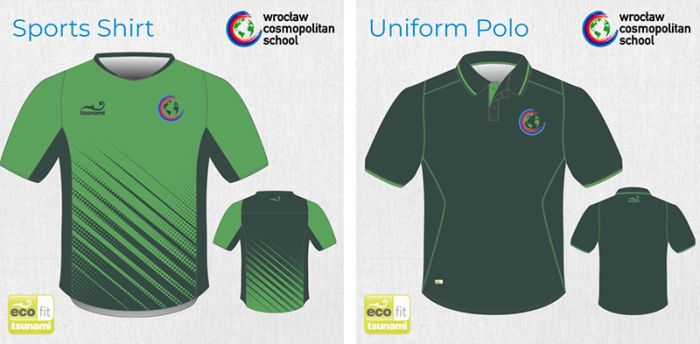
Our Kids: Why would parents choose your school over other schools?
Graham Lewis: Number one: the curriculum is amazing. I am very proud of how it has come together, not only in terms of its structure but also in the way it's documented — the progress and the assessment. It's an extremely in-depth documentation process. Also a very modern approach to learning in terms of having the inquiry model and the flexible spaces which enable close collaboration between different groups. We're not a textbook school, we don't use worksheets. We are technology-driven, inquiry-based but still very rigorous because everything we do is underpinned by the content objectives of two different national systems.
The school building
Our Kids: For quite a while you were looking for an appropriate location.
Graham Lewis: It was a big struggle to find a building that was appropriate. A lot of private schools of this size across Poland rent big villas, where they do some minimal conversion but this was not going to cut it for what we were doing, what we were telling parents and what the demand was. We have a three-story building that used to be a train wagon factory first, then a telecom office. We stripped it back to the mental structure and completely redesigned it, so we achieved this really amazing layout of the building with floor-to-ceiling glass, so it's transparent. There are no corridors but the zigzags that we call hubs.
The basis of the design is this architectural movement called “the learning neighbourhoods.” We have the primary learning neighbourhood in which the six classes open up to the hub where there is a library, resources, shared technologies, and on the top floor we have the same for the secondary level: the learning neighbourhood where all the specialist classrooms open up to the central hub. Now we are all ready to go with just that exciting final stage where we are choosing the finish of the desks and deciding on colours, etc.
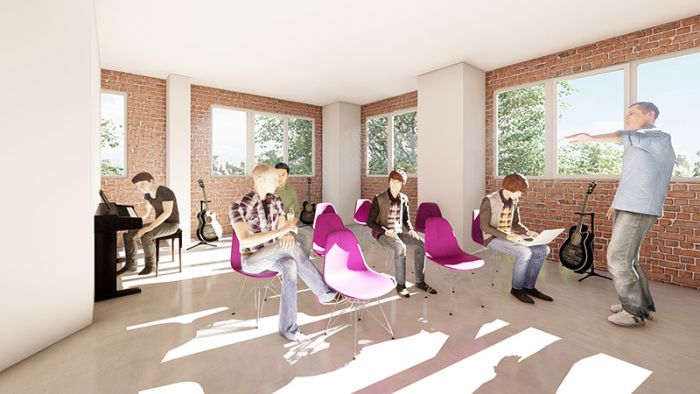
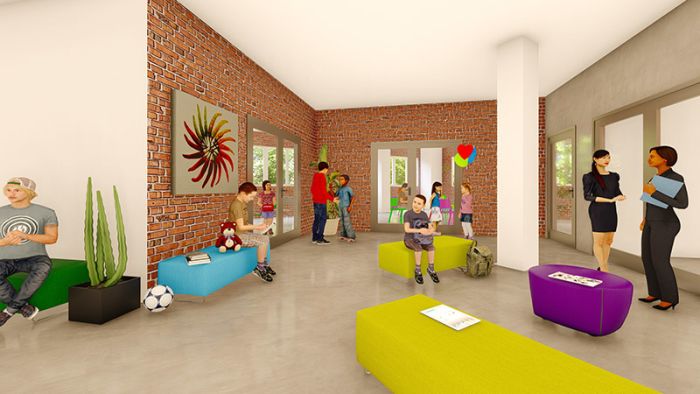
Students
Our Kids: Are you planning mostly to have children of those expats or children of people who come to Poland on contracts or do you also enrol Polish students?
Graham Lewis: Yes, we do. It is very important for us to have Polish students and we have between 40 and 50% of them, many of whom were part of the Polish diaspora and are now moving back to Poland from the UK, Canada, Australia or the Netherlands. Their kids have been going to schools there with a more modern approach so for them we are really the automatic choice because we have a blended model of delivery of the national requirements of the Polish curriculum, but in English, so that's quite a unique model.
Our Kids: So how many students are in the planning for the fall?
Graham Lewis: At this moment we have 107 confirmed and paid. That's already over the target because we were planning to have 100 when we open. I think we will hit 120 by September and will be full by Christmas.
Teachers
Our Kids: Who are your teachers?
Graham Lewis: We have 27 teachers so the ratio is amazing. Some are joining us from various international schools across Poland, we have some moving directly from the UK, some from Greece, and a contingent that I recruited in Hong Kong.
Our Kids: Do you also have Polish teachers?
Graham Lewis: Yes we do, some with really interesting backgrounds. One of our science teachers is Polish but she did her undergrad in Manchester in the UK and Masters and PhD in the US, where she was teaching at university. One of our preschool teachers studied education in Wales, a Polish language teacher was in the UK for 14 years teaching Polish in the Saturday school at the Embassy. We always find these cool collections where people have interesting international experience and are back In Poland now.
The curriculum
Our Kids: How do you manage to blend the English National Curriculum with Polish Core Curriculum?
Graham Lewis: We spent a long time before Christmas with lawyers and education consultants digesting every single requirement in each subject area and put them parallel with the English National Curriculum to look where there are overlaps. I don't think many schools have done that level of analysis of the two systems. They see things as incompatible where they're really not. If you compare the two national systems, for example, in mathematics, they're not that radically different, so we found one-to-one overlays in both and areas that are not covered and we built that into our units of inquiry. Making those inquiry units was the key because instead of having subject divisions we do four inquiry units per year with each primary class.
Our Kids: Can you give me some examples?
Graham Lewis: One of my favorite ones is at the end of Year 5 and is called “Wonderful Wrocław” so it’s a local community unit. It connects geography objectives from the National English Curriculum on rivers and physical geographical formations with the Polish history requirement of local history which gives an option to study some parts in detail, so we did Solidarity, which had a big role in Wrocław. We met the technology requirement looking at sustainable urban planning and the culminating project was for the students to develop a sustainable proposal for the city and design a bridge. So in this way we have really embedded all the subjects in a really exciting context.
Our Kids: The choice of the units is up to the school, right?
Graham Lewis: Yes, and the English curriculum allows us the flexibility that would not exist if we did IB (PYP) or the Cambridge program or any program off the shelf. We wouldn't be able to get this alignment with the Polish national curriculum. It had to be something that was bespoke. The English National Curriculum gives that kind of recognition and mobility that parents are looking for if they want to move to other international schools. IB does, too, but I think the English curriculum still has the edge in terms of across the world transferability. Also, we found that we could do more with it to make it fit our ethos and the assessment systems, so we do the English National Curriculum from Year 2 up, and we use the Welsh National Curriculum in early years 1 and 2.
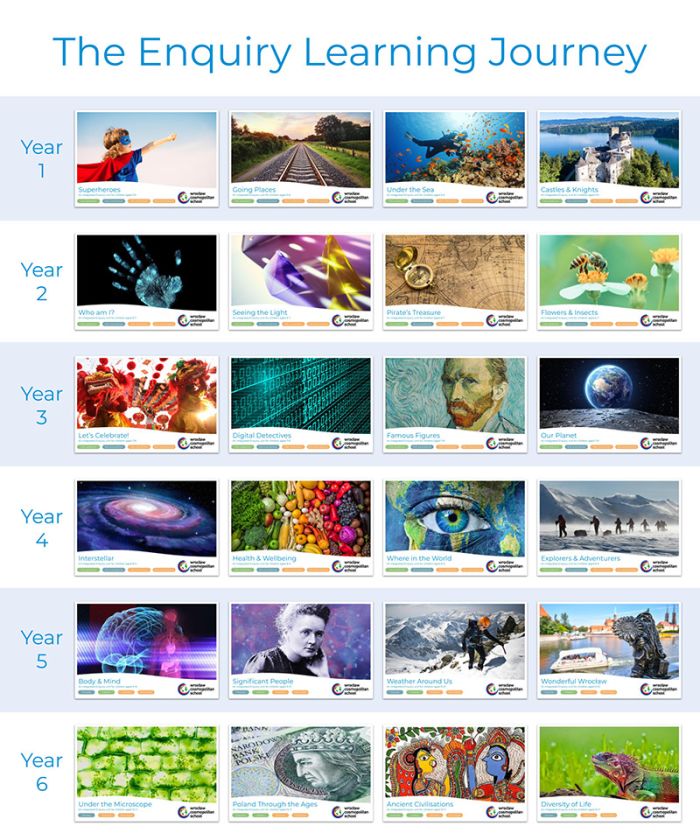
Our Kids: You use the Reggio Emilia approach in preschool. What was your reason for choosing it?
Graham Lewis: It's something that I've seen being really successful in my career. Also, we have two preschool teachers who are both very much Reggio Emilia fans. The parents want it as well. So we're determined to design a really amazing Reggio Emilia environment that will showcase what a good Reggio school should look like. It uses the inquiry model as well, so for us it was like a natural foundation block in the early years. It’s children's questions guiding their learning, the way the learning environment is designed so students are running with their interests. We have six school values that underpin everything we do, so all the activities and experience will be explicitly linked to the values and this is something that's truly innovative.
Our Kids: What about technology because this is something that you focus on a lot?
Graham Lewis: The emphasis is on students becoming independent users of technology. We put big emphasis on using digital learning portfolios as a way of students recording their learning. It then becomes an assessment tool. We use the Seesaw platform where you can really see progress. When you look at the child's journey, it's almost like time lapse — you can see how they develop in each area.
Our Kids: And your students have to take regular school exams?
Graham Lewis: Students will take the eighth-grade exam and from Year 10 up, at the high school stage, they will take IGCSE and then A-levels at the age of 18, when we expand to that stage. Now we're starting with Year 10, so we're now nursery to Year 10 in September.
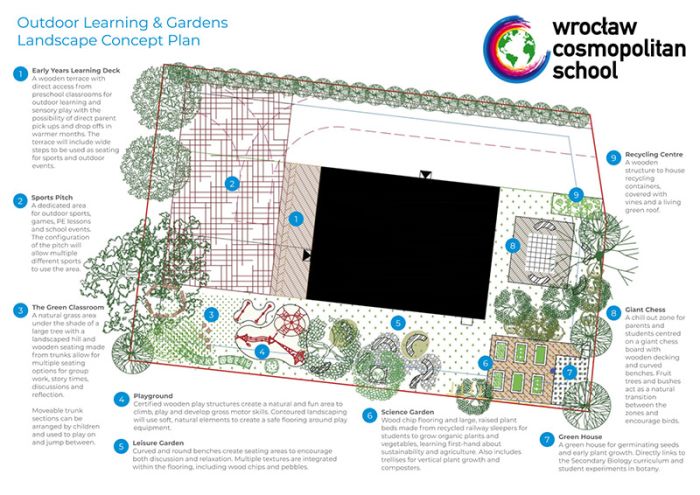
Extracurricular activities
Our Kids: What about extracurriculars?
Graham Lewis: Our approach is different from other schools — we’re not using the third-parties to organize those extracurriculars like they do in other schools. Our teachers have that in their contracts that they do extracurriculars. These are their hobbies and passions they want to share with the children. Deliberately we encourage secondary school teachers to run extracurriculars for younger kids and preschool teachers — for higher grade students so that everyone gets that community development experience. We are going to offer 30 in September from six different areas, such as sports, creativity, technology, and community outreach. I've always done a lot of advocacy for special needs so something like that will hopefully appear. We will have an animal shelter outreach, which was organized by one of our teachers.
Our Kids: Is all that included in your fees?
Graham Lewis: The fees are all-inclusive and include everything except transport and school uniforms.
Reactions to the new school
Our Kids: How was the idea of your new school received?
Graham Lewis: Very well both by individual parents and big corporations. Also the Wrocław Townhall has been very supportive because they also recognize the need for an international school that is fully legally compliant with the minimum aspects of the Polish curriculum. There has been massive excitement since the very beginning. We started teacher recruitment at the end of August almost a year ago and by September we had 50 CV applications for a school that was very much at the theoretical planning stage. At each parent event prior to the pandemic we had a hundred plus participants! It’s been a very busy but a very exciting year.
People who read this also viewed:
- Private schools in Wrocław
- Our Kids Interview: Get to know FSA School
- International schools in Warsaw
- International schools
- International schools in Kraków
- Advantages and disadvantages of studying in an international school
- Our Kids Interview: Get to know The British School Warsaw
- Our Kids Interview: Get to know The American School of Warsaw
- Our Kids interview: Get to know Regent College International Schools
- Mokotow High School Campus - a new Warsaw high school and Thames British School campus
-
Advice Guide
- ABC of educational terminology: Glossary of terms and concepts
- The admissions process
- Advantages and disadvantages of studying in an international school
- The application process
- Benefits of Polish private schools
- Bilingual schools
- Boarding schools
- Choosing a private or nonpublic school in Poland
- Compare schools in Poland
- English schools in Warsaw
- Homeschooling
- International schools in Kraków
- International schools
- Private school interviews
- Music education
- Myths about private education
- Non-public schools in Poland
- School open houses
- Our Kids Interview: Get to know EF Academy Oxford
- Our Kids Interview: Get to know Open School
- Our Kids interview: Get to know Regent College International Schools
- Our Kids Interview: Get to know The American School of Warsaw
- Our Kids Interview: Get to know The British School Warsaw
- Our Kids Interview: Get to know Wrocław Cosmopolitan School (two interviews, new video)
- Poland school profiles
- Private day schools
- Gifted schools & programs
- Private Jewish schools in Poland
- Language schools
- Private school tuition and costs in Poland
- Private schools in Poland
- Private schools in Poland offering French-language immersion
- English immersion schools
- Poland school uniforms
- Private special needs schools in Warsaw
- Public versus non-public schools in Poland
- Private school questions
- Private school rankings
- Reasons for choosing private schools - Our Kids’s survey report
- Religious schools
- Schools and classes for children with ADHD in Poland
- Social primary schools
- Social Schools
- Special educational needs (SPE) certificates
- Special needs schools
- Study abroad at a private school
- The first annual non-public school fair in Poland
- The first annual Our Kids non-public school expo in Warsaw was a great success
- Third Private School Expo in Warsaw - summary
- Types of schools
- Types of schools in Warsaw
- Warsaw preschool costs
- Why private school?
- Why parents go private
-
Grades
- Boarding high schools
- Choosing a high school in Poland
- Mokotow High School Campus - a new Warsaw high school and Thames British School campus
- Montessori nursery schools
- Montessori preschools
- Our Kids Interview: Get to know English Montessori School Katowice
- Our Kids Interview: Get to know FSA School
- Our Kids Interview: Get to know KIDS & Co.
- Our Kids Interview: Get to know Polish British Academy of Warsaw
- Our Kids Interview: Get to know The English Playhouse and The English Primary
- Poland education: grade levels
- Preschools in Warsaw
- Private & non-public preschools
- Private & non-public primary schools
- Private bilingual elementary schools in Warsaw
- Private high schools
- Private high schools in Warsaw
- Private middle schools
- Nursery schools
- Private primary schools in Warsaw
- Social high schools
-
Locations
- Boarding schools in Warsaw
- English schools in Kraków
- International Baccalaureate (IB) schools in Warsaw
- International schools in Warsaw
- Montessori schools in Warsaw
- Non-public schools in Warsaw
- Our Kids Interview: Get to know EF Academy
- Our Kids interview: Get to know Excellence in Education better
- Our Kids Interview: Get to know PRIMUS Non-Public Primary School No. 47 and Non-Public Secondary School
- Our Kids Interview: Get to know the Canadian School of Warsaw
- Our Kids Interview: Get to know The Primary and Secondary Schools of the Sisters of Nazareth in Warsaw
- Private Catholic and Christian schools in Warsaw
- Private day schools in Warsaw
- Private language schools in Warsaw
- Private schools in Bialystok
- Bydgoszcz schools
- Częstochowa schools
- Private schools in Gdańsk & Gdynia
- Katowice schools
- Private schools in Krakow
- Lublin schools
- Olsztyn schools
- Private schools in Poznań
- Private schools in Rzeszów
- Szczecin schools
- Private schools Warsaw
- Private schools in Wrocław
- Zielona Góra schools
- Private schools in Łódź






 POL
POL CAN
CAN